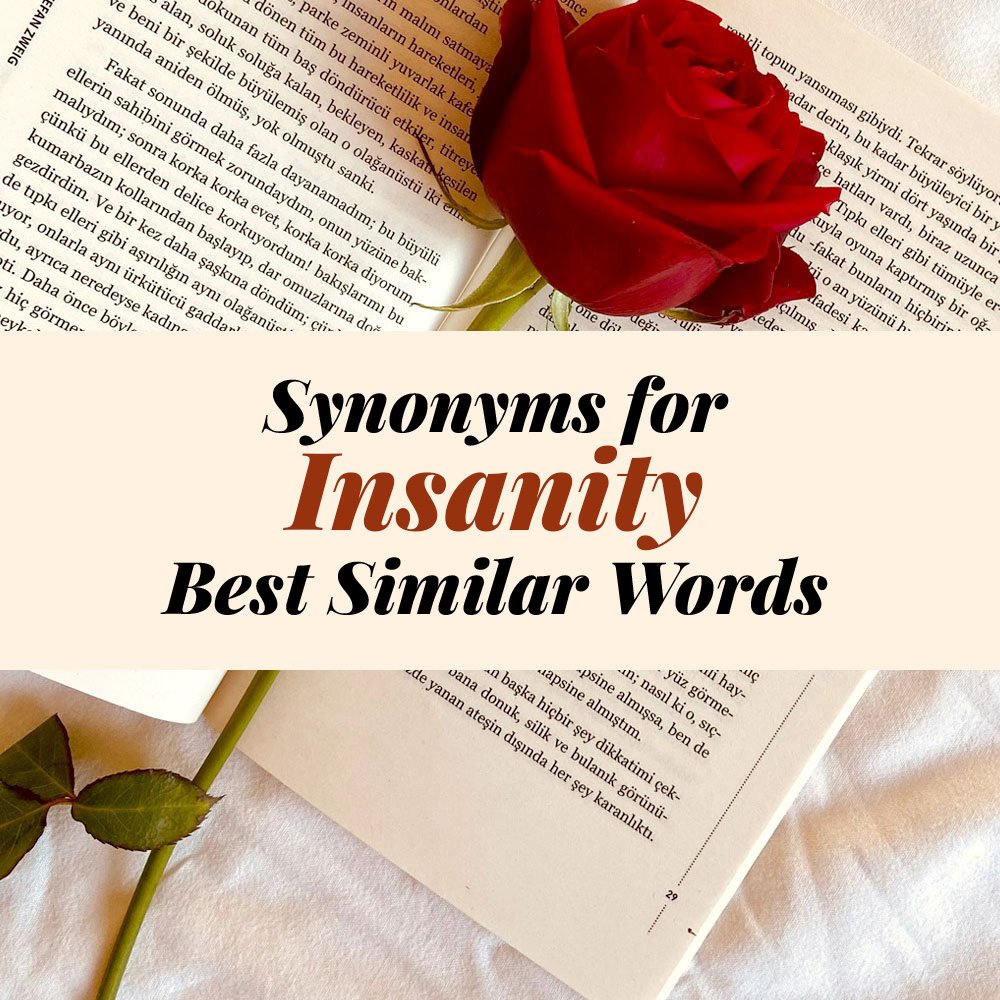Few words describe a state of extreme mental instability like insanity. When expressing this idea, you can use different words like madness, lunacy, or derangement. These words can make your writing more expressive and precise. In this article, we will explore 21 synonyms of insanity with examples and explanations to help you use them confidently.
| Synonym | Example |
|---|---|
| Madness | His sudden outburst was pure madness. |
| Lunacy | Jumping into the storm was sheer lunacy. |
| Derangement | The plot shows the character’s derangement. |
| Craziness | Her laughter showed her craziness. |
| Frenzy | The crowd was caught in a frenzy. |
| Mania | He was gripped by mania for collecting stamps. |
| Hysteria | The news caused hysteria among the townspeople. |
| Dementia | Old age brought him dementia. |
| Insanity | His behavior showed signs of insanity. |
| Unreason | Acting without thought is unreason. |
| Delirium | Fever caused him delirium. |
| Folly | Trusting him was an act of folly. |
| Psychosis | The patient showed signs of psychosis. |
| Cuckoo | That idea is cuckoo. |
| Bonkers | She went bonkers after hearing the news. |
| Nutty | His plan seemed nutty. |
| Crackup | After the accident, he had a crackup. |
| Absurdity | Believing in ghosts is absurdity. |
| Unbalanced | Her thoughts were completely unbalanced. |
| Madness | The game drove him into madness. |
| Derangement | Stress led to his mental derangement. |
21 Different Ways to Say INSANITY: Another Word for Insanity
Madness
Madness is a strong word for extreme mental instability. It shows wild, uncontrolled, or irrational behavior. This word is best when someone acts in a way that seems crazy. Madness can describe serious or playful situations. It helps make your writing more intense and descriptive.
- His sudden outburst was pure madness.
- The plan was sheer madness.
- People laughed at his madness.
- Driving so fast was madness.
Lunacy
Lunacy is used to describe very foolish or extreme actions. It originally meant the moon could affect the mind. Use it to show behavior that is completely unreasonable. It works in casual stories or serious writing. Lunacy makes readers see how far someone’s thinking is from normal.
- Jumping into the storm was sheer lunacy.
- His idea of flying was lunacy.
- Spending all money at once is lunacy.
- The politician’s plan showed lunacy.
Derangement
Derangement shows a state of mental disorder or confusion. It is often used in medical or serious contexts. You can also use it in stories to show extreme behavior. This word works when thoughts are disturbed or actions are unpredictable. It explains how someone’s mind is not functioning well.
- The plot shows the character’s derangement.
- Her derangement caused confusion in the team.
- Fear led to his derangement.
- He suffered derangement after the incident.
Craziness
Craziness describes unusual, wild, or extreme behavior. It is casual and can be fun or serious. Use it to show silly or unpredictable actions. Craziness is great for storytelling or conversation. It makes characters or situations feel lively and unpredictable.
- Her laughter showed her craziness.
- The party was full of craziness.
- His hair color showed craziness.
- The plan had an element of craziness.
Frenzy
Frenzy refers to uncontrolled excitement or activity. It is often used for crowds, panic, or intense emotion. This word shows chaos or high energy clearly. Use frenzy to describe a sudden burst of wild behavior. It works for stories, news, or fun writing.
- The crowd was caught in a frenzy.
- She worked in a frenzy to finish.
- Panic turned into frenzy.
- The fans screamed in frenzy.
Mania
Mania is extreme passion or obsession. It can describe mental illness or strong interest. Use mania when someone acts with uncontrollable energy or focus. It is effective to show intensity or dedication. Mania highlights behavior that is more than ordinary excitement.
- He was gripped by mania for collecting stamps.
- Her mania for cleaning is endless.
- Sports can cause mania in fans.
- His mania led him to work nonstop.
Hysteria
Hysteria means extreme panic or uncontrolled emotion. It is used for individuals or groups. Hysteria works in dramatic, emotional, or tense situations. Use it to show fear, shock, or excitement that is very strong. It conveys high emotional intensity.
- The news caused hysteria among the townspeople.
- Children screamed in hysteria.
- Her hysteria scared everyone.
- The announcement led to public hysteria.
Dementia
Dementia is a serious mental decline affecting memory or thinking. It is often medical but works in descriptive writing. Use dementia to show loss of control or confusion. This word explains long-term or age-related mental instability clearly.
- Old age brought him dementia.
- Her dementia affected daily life.
- He forgot names due to dementia.
- Dementia changed his behavior.
Insanity
Insanity describes extreme mental illness or irrational behavior. It is widely recognized and formal. Use it in serious writing, legal contexts, or emotional storytelling. Insanity expresses behavior far outside what is normal or acceptable.
- His behavior showed signs of insanity.
- The act was pure insanity.
- People feared his insanity.
- She questioned his insanity.
Unreason
Unreason is behavior without logic or good judgment. It works in formal or casual writing. Use unreason to show foolish or irrational actions. It is good for pointing out decisions that do not make sense.
- Acting without thought is unreason.
- His choices were full of unreason.
- The plan showed unreason.
- Her reaction was unreason.
Delirium
Delirium is confusion caused by illness or extreme excitement. It can also show uncontrolled emotional states. Use delirium for temporary mental instability. It works in storytelling or medical descriptions.
- Fever caused him delirium.
- The patient was in delirium.
- Excitement led to delirium.
- His speech showed delirium.
Folly
Folly is foolishness or poor judgment. It is useful in stories, advice, or warnings. Use folly to show actions that are unwise or risky. It highlights mistakes or unthinking behavior.
- Trusting him was an act of folly.
- Investing in scams is folly.
- His folly led to trouble.
- Ignoring advice is folly.
Psychosis
Psychosis is a severe mental disorder where reality is lost. It is used in medical and psychological contexts. Use psychosis to describe serious mental instability. It shows extreme detachment from reality.
- The patient showed signs of psychosis.
- Psychosis affected his daily life.
- Treatment reduced his psychosis.
- Symptoms of psychosis were clear.
Cuckoo
Cuckoo is playful and informal. It describes silly, strange, or crazy behavior. Use cuckoo in lighthearted conversation or stories. It gives humor and exaggeration to describe odd actions.
- That idea is cuckoo.
- She went cuckoo over the gift.
- His plan seemed cuckoo.
- The joke made him cuckoo.
Bonkers
Bonkers is informal and fun. It shows someone is acting crazy or strange. Use bonkers for humorous or casual situations. It makes writing playful and expressive.
- She went bonkers after hearing the news.
- His idea sounded bonkers.
- He acted bonkers at the party.
- The situation was completely bonkers.
Nutty
Nutty is informal, showing odd or eccentric behavior. It works in playful contexts. Use nutty to describe quirky, funny, or unusual actions. It emphasizes a light version of insanity.
- His plan seemed nutty.
- The movie was nutty and fun.
- She had a nutty idea.
- The dog acted nutty.
Crackup
Crackup shows mental breakdown or extreme stress. It is informal but serious. Use crackup to describe sudden collapse or overwhelming pressure. It shows mental strain and instability clearly.
- After the accident, he had a crackup.
- Stress led to her crackup.
- The news caused a crackup.
- He warned about the crackup.
Absurdity
Absurdity shows ridiculous, unreasonable, or illogical behavior. Use absurdity to criticize or describe crazy actions. It works in both casual and formal writing. It highlights the silliness or extreme nature of something.
- Believing in ghosts is absurdity.
- The story is full of absurdity.
- His claim showed absurdity.
- The joke revealed absurdity.
Unbalanced
Unbalanced shows lack of mental or emotional stability. It can describe thoughts, feelings, or actions. Use unbalanced for behavior that is irrational or uneven. It conveys mental instability clearly.
- Her thoughts were completely unbalanced.
- The plan seemed unbalanced.
- His emotions were unbalanced.
- The decision was unbalanced.

Final Thoughts
Exploring different words for insanity makes writing expressive and vivid. Each synonym carries a special meaning. Choosing the right one brings clarity, emotion, and depth to your sentences, making your ideas memorable.









